“If it wasn’t working, I could see the point of changing. But we were more successful than ever. It was incomprehensible”: The tumultuous story of Sepultura’s Roots album and their bitter split
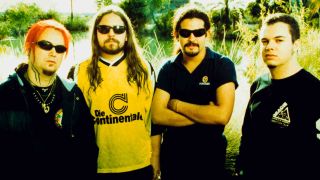
Sepultura’s 1996 album Roots was one of the most pivotal albums of that decade, priming the band for even bigger success – but instead it prompted the departure of frontman Max Cavalera and the end of the band’s classic line-up. In 2018, all four members looked back on how Brazil’s greatest band snatched defeat from the jaws of victory,
Sepultura were one of the greatest and most unexpected success stories of the mid-90s. Four kids from the cultural backwater of Belo Horizonte, Brazil, they journeyed from sub-underground death metal no-hopers into global ambassadors for their home country, and for metal as a whole.
The band’s still-explosive 1989 album Beneath The Remains served notice of their impending genius, but it was their fifth full-length record, 1993’s Chaos AD, that found Sepultura jumping several gears, pushing them far beyond their contemporaries. Its groundbreaking mix of jagged noise and South American influences sounded like nothing that came before it, while frontman Max Cavalera raged against corruption and stupidity with the conviction of a man who had nothing left to lose.
The album connected instantly, smashing into the UK Top 20 and the US Top 40 like a Molotov cocktail. Successful tours with the likes of Pantera and Ministry followed.
“During the making of Chaos AD, we were very focused, very organised, very connected,” says guitarist Andreas Kisser. “We were together, it was a very special moment in Sepultura’s career.”
But there were downsides. The pressures of success, and the responsibilities of being flagbearers for a new generation of metal bands soon began to have an effect on the ‘classic Seps’ line-up of Max, Andreas, bassist Paulo ‘Jr’ Pinto and drummer, Max’s brother Iggor Cavalera.
“All of a sudden we’re this really big machine and we couldn’t really comprehend it,” says Max. “We didn’t know how to deal with it.”
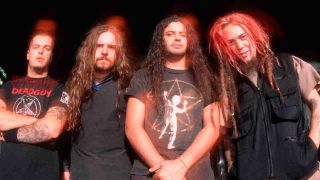
On October 1995, Sepultura entered Indigo Ranch Studio in Malibu to record the follow-up to Chaos AD with rising nu metal producer Ross Robinson. The album built on the indigenous Brazilian influences of its predecessor, simultaneously taking them further away from their death metal past towards an incendiary, groove-driven battery.
Max: “There was no pressure on the music side. We’d proved that we could take this thing in any direction we wanted, and it was great.”
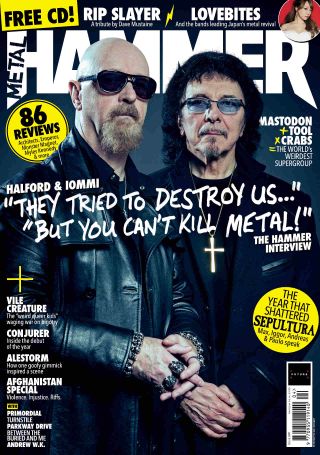
Iggor: “It was very early where Max came up with the Roots song, and from then on we were building, thinking about what would be the ‘roots’ of our music. We did a lot of crazy experimenting.”
Andreas: “Ross Robinson had a whole new perspective. He came and showed a lot of new possibilities for us. He really brought that idea of the ‘Brazilianness’: the jams, the free approach to everything.”
Iggor: “He was pushing a lot of crazy ideas. I remember coming back from the studio with a tape we’d done there, and I didn’t know what we were going to do with it, ’cos there was so much going on – a thousand guitars on a take with noises and percussion, that kind of thing. I was a bit confused.”
Max: “The greatest thing was having the combination of Ross and [engineer] Andy Wallace. Ross recorded it on his own and it sounded like total dogshit – not for human consumption. We’d send it to Andy. It would be like sending him a diamond covered in shit, and he had to clean all the shit from it to make the diamond shine, which is what he did.”
Paulo: “When Andy came into the mix, he knew how to make that really noisy, grungy mass sound good.”
Andreas: “It came out very positive. I think that was a merit of the band – to funnel the stuff that was going on in our lives into our music.”
Sepultura – Roots Bloody Roots [OFFICIAL VIDEO] – YouTube ![Sepultura - Roots Bloody Roots [OFFICIAL VIDEO] - YouTube](https://img.youtube.com/vi/F_6IjeprfEs/maxresdefault.jpg)
Released in early 1996, Roots built on the success of its predecessor on both sides of the Atlantic. But imperceptible fault lines were opening up within the band. On one side was Max and his wife, the band’s manager Gloria. On the other were Andreas, Paulo and Iggor.
Andreas: “Things had started to go kind of weird before that. When [Max and Gloria’s son] Zyon was born, instead of putting a band on the cover of a magazine, they had Max with his kid. That’s nothing to do with the band. To have a kid is not that special. I have three myself. I love them, but I don’t use them as a trophy.”
Paulo: “I guess things weren’t right when we started to tour Roots. We saw things were not being represented the way the three of us would like. The other party was taking credit for everything and not really giving the rest of the band the credit for what we worked for.”
Andreas: “Concepts of what Sepultura should be were changing. Max was already being detached from the unity that we had. It was a lead singer with his support band type of vibe. And Gloria was doing a horrible job – she was not trying to keep anything together.”
Iggor: “There was a lot of stupid stuff. Just a lot of drama over nothing. You get to the point where you travel so much, little things can be super- dramatic. It’s like Spinal Tap – people would freak out over not having the sandwich we wanted.”
Max: “We started seeing all these shady guys in the dressing room, managers meeting with the other three guys, trying to steal the band from Gloria’s management.”
Andreas: “Sepultura only works if we are a band, if we can talk to each other and respect each other. We were at a point where we were just going onstage to play, and that’s how they wanted to keep going.”
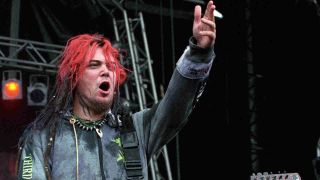
On August 1996, Sepultura arrived in the UK to play the Monsters Of Rock festival at Castle Donington, opening for Kiss and Ozzy. They were greeted by the tragic news that Gloria’s son, Dana Wells, had been killed in a car accident at home in Phoenix.
Andreas: “We just arrived in England to play Castle Donington, and we got the news. I was the one to bring the news to Gloria. I took her away from her room and told her.”
Max: “The minute we arrived, there was a knock on the door and it was Andreas – he had this pale, ghostly expression that I’d never seen before, and I knew that something was incredibly wrong. He told Gloria, ‘Your son died.’ From that moment on, the whole day just spiralled out of control. Sharon and Ozzy Osbourne really helped us a lot, they’re the ones that helped us get back home. Without them, we couldn’t have got home so quick.”
Andreas: “We had a big show, in our heads probably one of the biggest shows in Sepultura’s career, and we decided to go ahead and do the show as a trio. I’m glad we did. There were mixed emotions. A profound sadness for a huge loss, but at the same time playing at Castle Donington. It was very weird. I don’t think I’ll ever experience anything like that again.”
Max: “I spent the night before the funeral with Jason Newsted, making a cassette tape with Dana’s favourite songs. We put a cassette player on his coffin and we let it play until the batteries ran out. During the funeral there was a jam session between Andreas and Jason, playing acoustic guitar – they made that for Dana. It was beautiful, really touching.”
Andreas: “But from that point, the whole emotional instability just got bigger. Especially from Gloria’s family.”

Rather than bring the two warring factions together, Dana’s death only drove them further apart. The tensions that had been simmering came to the boil post-Donington. Andreas, Paulo and Iggor decided that they no longer wanted Gloria to manage Sepultura.
Andreas: “We had the contract. We had a legal tool on our side, where we could exercise an option not to continue with Gloria because we wanted to change the way Sepultura’s business was done. And they didn’t want to hear it.”
Max: “The other three guys, they just stopped talking to Gloria completely, which was really cold. Who does that? I had my own brother doing that, which was really hard to understand.”
Paulo: “We tried to talk to Max but it was hard.”
Max: “You don’t just change people for no reason. If it wasn’t working, I could see the point of changing: ‘Yeah, let’s change, we gotta do something.’ But that wasn’t the case at all. We were more successful than ever. It was incomprehensible.”
Andreas: “We had a big fight with Gloria in Buenos Aires [on November 14, 1996]. That’s where Sepultura ended. But we decided to go to Europe to do the tour, to try and make Sepultura possible for another year. It was crazy.”
Sepultura – Ratamahatta [OFFICIAL VIDEO] – YouTube ![Sepultura - Ratamahatta [OFFICIAL VIDEO] - YouTube](https://img.youtube.com/vi/NiwqRSCWw2g/maxresdefault.jpg)
Sepultura’s European tour began in Belgium on November 20, 1996, and ended just under a month later at London’s Brixton Academy on December 16 – the day their contract with Gloria Cavalera ended. Immediately after that final show, all the issues that had been brewing finally came to a head. Interestingly, the former bandmates have very different views on how the show itself went.
Max: “The show was fantastic, super-energetic, high energy – we were playing really good.”
Andreas: “I know it was great and everything, but it could have been much better if we were a band.”
Paulo: “It was a very shitty show.”
Iggor: “At the end of the show, it was, like, ‘It cannot continue like this.’ That’s when we took the decision we did.”
Andreas: “We terminated our deal with our manager there, and [Max and Gloria] decided to leave Sepultura.
Max: “I don’t think it was in the dressing room. It was more on the bus ride going to the airport. I probably had a little bit to drink, so I was on the edge. I told them, ‘If that was how it was going to be, fuck you all, I’m out of here.’”
Iggor: “I don’t know if anyone tried to talk Max out of leaving. It was a lot of turbulent times.”
Andreas: “Of course we tried to talk Max out of leaving.”
Max: “Gloria tried to talk me out of it. She told me go with them. I couldn’t. I just couldn’t. I’m not that kind of person. I cannot fuck people over like that. That’s how great of a person she is – just go with them, stay with them. I’m, like, ‘I’m not doing that to you. It’s absurd.’ They had a meeting to try to get me back.”
Andreas: “It’s really hard when you do a meeting with Max and Iggor. You can spend two hours talking, some explanation of stuff, and somehow they leave there and nothing happens. It’s really weird way of doing business.”
As the shock news of the split between Max and his former bandmates broke, both parties retreated to take stock. Inevitably, the shattered relationship turned poisonous, with barbs thrown in the press. Privately, both parties were facing an uncertain future.
Max: “I could have gone, ‘Fuck you all, this is my band.’ I could have if I’d wanted to. It was my band, invented by me, the name and everything. I just felt it was easier to walk away. But it was six months of hell. I lived in my room, just drinking and taking drugs all day long. I didn’t want anything to do with music.”
Andreas: “We were abandoned. We lost everything that took 10 years to build. We had to cancel shows in Australia and Japan – it was really bad. Bad blood with promoters and everything. All the budgets and big money went to Soulfly. Ross Robinson and Andy Wallace went to Max. We had to rebuild everything.”
Paulo: “Nobody gave us the credit we deserved. We had to start from scratch.”
Max: “I didn’t know what they were going to do, honestly. But Andreas is a very ambitious guy. I knew he was probably going to find someone and give it a go. I thought they might even get somebody like Robb Flynn. I was, like, ‘If that happens, I’m fucked.’”
Andreas: “We wanted to change the name, start something totally different. But slowly we put our heads in place and balanced all the options and talked to a lot of people. We were nine months working to find a new manager, a new singer, a new producer – to find a new way to keep Sepultura going.”
Max: “The hardest part was Iggor, because he was my brother. I was, like, ‘How could you do that to me?’ I don’t know, man. It had a bit to do with greed, it had a bit to do with human nature.”
Iggor: ‘It was horrible. Me and Max being so close together for so many years, doing our little thing, it was very hard. But anybody who has brothers knows how it is a completely different thing than dealing with a friend. With a brother, it doesn’t resolve just by talking. It needs something extreme to happen so you both understand what was going on.”
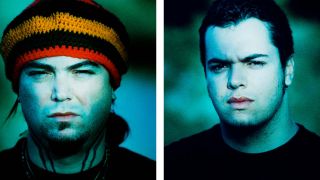
In the race to release an album, Max’s new project, Soulfly, were first out of the gate. Their self-titled debut emerged in April 1998, produced by Ross Robinson and featuring members of Fear Factory, Deftones, Limp Bizkit and Dub War. The reconstituted Sepultura, now fronted by American singer Derrick Greene, followed six months later with Against. Both albums were accompanied by potshots directed at the other camp in the press – a pattern that would be repeated over the next few years. But further upheaval struck Sepultura in 2006 when Iggor jumped ship to reunite with his brother.
Iggor: “The decision to leave Sepultura wasn’t hard. It was harder to continue without my brother. We’d just had a son, and my wife was really sad: ‘Your brother has never seen our son, that’s not right.’ And I was, like, ‘She’s right.’ So I reached out and talked to him. That was the first step.”
Max: “He came back and apologised. He told Gloria he was wrong, which is great. To admit that he was wrong on that whole thing, it was really cool of him to do that.”
Iggor: “I flew to Phoenix to hang out with Max. We were influenced a lot by the whole thing with Pantera, the Dimebag thing – like, ‘Look, these guys cannot do what we’re doing right now.’ We know how life, it’s super-short. So I was, like, ‘Fuck it, I just want to hang out with my brother.’”
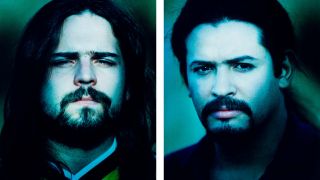
As both sides warily circled each other with teeth bared, there seemed little chance of a reunion of the classic Sepultura line-up, despite huge offers dangled in front of them by promoters. Then, in late 2010, rumours circulated that the band were planning to reunite. Sepultura released a video statement refuting the rumours.
Max: “I was trying for it. I thought it’d be very cool. Especially after I saw Faith No More get back together. It’s like, ‘Why can’t we do the same?’ I actually talked to Andreas on the phone about it, like, ‘Come on man, let’s do this. Let’s fucking do it. The whole world wants it. It would be a great thing.’ And he agreed with me, then a couple of weeks later it was all back to shit again. So I was, like, ‘Fuck it, I’m not going to try any more.’”
Andreas: “There’s been many reunion conversations, especially with Gloria. It’s always them approaching us.”
Iggor: “I think there was some talk. But I never sit down with those guys to discuss anything, so I don’t know how serious those things were.”
Andreas: “We both played at a festival in Germany [in 2009], Sepultura and Soulfly, for the first time. Our bus was parked here and their bus was parked a few metres away. I went out there, Gloria was there. I give her a hug: ‘Hey, what’s up, how’s it going?’ And since then, she was like, ‘OK, maybe we could put all this bad stuff back and we could try again.’ It didn’t go further, because it’s something that’s completely out of reality. It’s not a part of what we are. That Sepultura they have in mind, it’s not us.”
Max: “It was Gloria’s idea for me and Iggor to tour the Roots album (2017’s Roots Reunited tour). I think a lot of fans just wanted to hear the original voice and original drumming. They didn’t care that Paolo and Andreas weren’t in the picture, which was proven by the success of the tour. It sold out everywhere. It was a great tour.”
Andreas: “It’s sad to be dragging up the past. That’s why we don’t spend our time doing tribute tours and shit. We’re very much focused on what we’re doing now, today. We put our energy and efforts into creating a new Sepultura every day.”

Today, the gulf between Sepultura and the Cavalera brothers is as wide as ever. Both camps continue to release albums to varying degrees of acclaim, though with only a fraction of the commercial success they enjoyed with Chaos AD and Roots. When it comes to what could’ve been, all members remain philosophical on the subject.
Iggor: “I have no idea how things would be if we’d gotten through the problems.”
Max: “I think we would have been extremely big if we had stayed together. Not as popular as Metallica, but popular. But then Soulfly came about, so it was a blessing in disguise. I last spoke to Andreas six years ago, and I’ve not spoken to Paolo once. Never.”
Andreas: “Do I miss being in a band with Max? No. Not at all. I don’t know him today. I don’t know the person he is.”
Max: “There were some good times, it wasn’t all bad. We actually had a lot of fun. The friendships were cool, you know? I miss that sense of, ‘We can do it, we can conquer the world.’”
Andreas: “There’s no regret at all. I don’t see why we should be regretful when we are in a better place now.”
Max: “Maybe we should have took a year off and come back better than ever. Maybe we would have found a solution for the whole Gloria thing, the whole management thing. At that time, we were not thinking about that. Hot heads prevailed. Would I have done anything differently? I don’t know. I think it was meant to be.”
Originally published in Metal Hammer 307, March 2018
